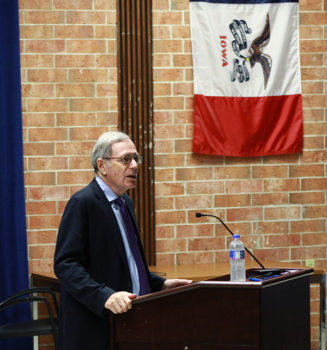
Professor Eric Foner of Columbia University spoke about the Reconstruction Era in the Building 6 Auditorium at DMACC on Monday, Sept. 18.
One of the nation’s foremost historians spoke to a packed crowd as part of Constitution Day at DMACC Ankeny, Monday Sept. 18, in Building 5.
Eric Foner, professor of history at Columbia University in New York City, is an expert on the Civil War. He has written numerous books on the subject and has won multiple awards for his work, including the Bancroft Award, the Lincoln Prize and even a Pulitzer.
Introduced by DMACC History Professor Joe Danielson, Professor Foner spoke about how the Civil War and reconstruction changed the meaning of the Constitution. He focused on the Reconstruction Era after the war, which birthed the 13th, 14th and 15th Amendments, and clarified which basic civil rights were to be afforded to whom.
“Eric Foner’s talk was remarkable and timely” and it “resonated with those in attendance,” said Danielson via email after the speech.
The 13th Amendment abolished slavery. Many believe the Emancipation Proclamation did this, but according to Foner, the proclamation merely freed the slaves. It was the 13th that changed the laws protecting slavery. There is one loophole, perhaps unintentionally left but there nonetheless in the wording of the 13th Amendment. It allows for a version of slavery to be imposed as punishment for a crime, which means we can force criminals to work for a pittance.
The 14th Amendment answered many remaining questions the south had about the Civil War. It stated that there would be no monetary compensation for those who lost slaves, that none of the bonds issued by the confederate government would be honored and that the debt issued by the U.S. must be paid.
As Foner pointed out, it also offered a bit of incentive to the states to allow black men to vote, stating that congressman would be assigned based on the number of voters and not the total population. If they wanted more Congressional clout, they needed to give the vote to black men.
The 15th Amendment states that, “The right of citizens of the United States to vote shall not be denied or abridged by the United States or by any State on account of race, color, or previous condition of servitude.”
According to Foner, there was criticism at the time from the more radical Republican members of congress because they wanted the amendment to be phrased as a positive: “All males have the right to vote…”
The way it is phrased allows for it to be altered. Historically, this has been demonstrated through poll taxes, insisting on voters being literate, and insisting that voters understand even the most complicated portions of the state Constitution.
Professor Foner quoted Thomas Wentworth Higginson to sum up why it was important to study the Reconstruction Era: “Revolutions may go backward.” Though our rights and the rights of others are protected under the 13th, 14th, and 15th Amendments, it is up to us to make sure that they are enforced sensibly, and we can’t do that if we don’t understand what they give us and why, Foner said.
“I sincerely appreciate the hard work and efforts by Helen Ventura, Laura Hebbein, and Steve Forman from W. W. Norton & Company for bringing Eric Foner to DMACC,” said Danielson. “A fellow faculty member told me that she overheard a student enthusiastically say ‘That was fun’ as he left the auditorium.”





Comments